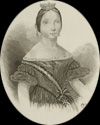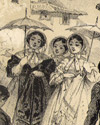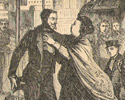19th Century´s militar history in the Basque Country
ISABEL II. (1830-1904)
 The first-born of Ferdinand VII and Maria Christina of Bourbon, Isabel II was born in 1830 and crowned Queen at the age of three. Given her uncle
Don Carlos' refusal to recognise her as queen, her proclamation led to the First Carlist War.
The first-born of Ferdinand VII and Maria Christina of Bourbon, Isabel II was born in 1830 and crowned Queen at the age of three. Given her uncle
Don Carlos' refusal to recognise her as queen, her proclamation led to the First Carlist War.
While she was underage, her mother, Maria Christina acted as regent (from 1833 to 1840), followed by Espartero (1840-1843). The Regent relied on the support of the Liberals who were well aware of the absolutist stance of Don Carlos and took advantage of her weakness to gain power.
After the fall of the Progressive Espartero After the fall of the Progressive Espartero returned to power.
Her early marriage to her cousin Francis of Asis in 1846 led to a new Carlist insurrection because the hopes of a dynastic union by her marriage to the son of Don Carlos were not met. Young, frivolous and full of life, it is said that she had countless lovers throughout her reign. She had eight children, the eldest of whom, Alfonso, acceded to the throne in 1874.
 Her reign was marred by diverse scandals caused by her being entirely under the influence of an entourage of visionaries, including Sor Patrocinio, the stigmata nun, and her confessor, Father Fulgencio, all of which made her fairly unpopular.
Her reign was marred by diverse scandals caused by her being entirely under the influence of an entourage of visionaries, including Sor Patrocinio, the stigmata nun, and her confessor, Father Fulgencio, all of which made her fairly unpopular.
Isabel II was also responsible for starting the Bourbon tradition of travelling to San Sebastián for sea bathing when, in 1845, she visited the city with her mother on medical advice.
 During her reign, a series of acts were passed, including the Moderate Constitution of 1845, the Madoz Disentailment Act (1855), and the public instruction known as the Moyano Act (1857), which remained in force until well into the twentieth century. The Spanish Civil Guard was also created (1844) and, in the international political sphere, Spain expanded into North Africa with the War of 1859-60.
During her reign, a series of acts were passed, including the Moderate Constitution of 1845, the Madoz Disentailment Act (1855), and the public instruction known as the Moyano Act (1857), which remained in force until well into the twentieth century. The Spanish Civil Guard was also created (1844) and, in the international political sphere, Spain expanded into North Africa with the War of 1859-60.
The revolution of 1868 ended her reign and forced her into exile in France until her death in 1904.

